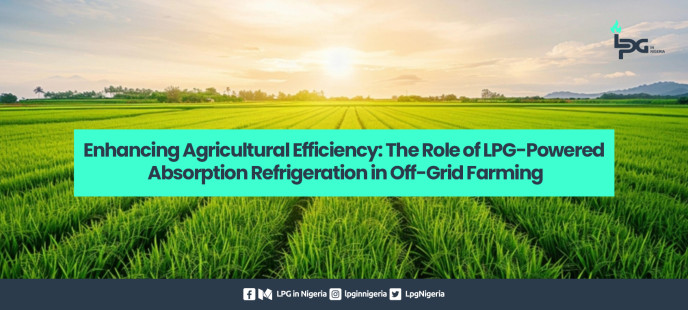- 2978
- 0
Sharing Ideas and Updates on LPG in Nigeria and related information to enable effective collaboration within the LPG Value Chain
Enhancing Agricultural Efficiency: The Role Of LPG-Powered Absorption Refrigeration In Off-Grid Farming

In many rural and off-grid regions, reliable refrigeration is a critical yet often inaccessible resource for farmers. The absence of dependable electricity hampers the preservation of perishable goods, leading to significant post-harvest losses. Liquefied Petroleum Gas (LPG)-powered absorption refrigeration systems offer a viable solution to this challenge, providing efficient and sustainable cooling essential for modern agriculture.
Understanding LPG-Powered Absorption Refrigeration
Unlike conventional electric refrigerators that utilize mechanical compressors, absorption refrigeration systems employ a heat source to drive the cooling process. In LPG-powered units, the combustion of LPG generates the necessary heat to initiate this cycle. The process involves:
1. Heat Generation: LPG combustion produces heat, which is applied to a generator containing a solution of ammonia and water.
2. Evaporation: The heat causes the ammonia to evaporate, separating it from the water.
3. Condensation: The ammonia gas then passes through a condenser, releasing heat and reverting to a liquid state.
4. Absorption and Cooling: In the evaporator, the liquid ammonia absorbs heat from the refrigerator's interior, producing a cooling effect. The ammonia then recombines with water, and the cycle repeats.
5. This method is particularly advantageous in off-grid locations, as it eliminates the dependence on electrical power, utilizing readily available LPG to maintain essential refrigeration.
Applications in Agriculture
The integration of LPG-powered absorption refrigeration in agriculture addresses several critical needs:
1) Cold Storage for Perishables: Fruits, vegetables, dairy products, meat, and fish require consistent cooling to prevent spoilage. LPG refrigeration units enable farmers to preserve these goods, extending shelf life and reducing waste.
2) Seed Preservation: Maintaining seeds at controlled temperatures is vital for ensuring high germination rates and robust crop yields. LPG-powered systems provide the necessary environment for effective seed storage.
3) Greenhouse Climate Control: Regulating temperature and humidity within greenhouses is essential for optimal plant growth. LPG systems offer a reliable means to create and maintain these conditions, enhancing productivity.
Benefits of LPG Refrigeration in Off-Grid Farming
Adopting LPG-powered refrigeration systems offers numerous advantages:
1. Energy Independence: For farms located far from power grids, LPG systems provide a dependable and autonomous energy source, ensuring that refrigeration needs are consistently met without reliance on external electricity.
2. Cost-Effectiveness: LPG is often more affordable than diesel or kerosene, leading to reduced operational expenses. Additionally, LPG appliances tend to be more energy-efficient, resulting in further savings over time.
3. Environmental Sustainability: LPG burns cleanly, emitting fewer greenhouse gases compared to other fossil fuels. This contributes to a lower carbon footprint, aligning with sustainable agricultural practices.
4. Reliability and Durability: LPG-powered refrigerators are known for their robust construction and longevity, making them well-suited for the demanding conditions often found in rural farming environments.
Enhancing Food Security and Farmer Livelihoods
Implementing LPG-powered absorption refrigeration directly impacts food security by minimizing post-harvest losses. With effective cooling solutions, farmers can preserve their produce longer, access broader markets, and secure better prices. This not only boosts their income but also ensures a stable food supply for communities.
In conclusion, LPG-powered absorption refrigeration systems are transforming agricultural practices, especially in off-grid areas. Their efficiency, environmental benefits, and reliability make them an invaluable asset in the quest for sustainable and productive farming.
Sources: Tankfarm, griffisgas.com, lpgasmagazine.com,warehouseappliance.com
















0 Comment.